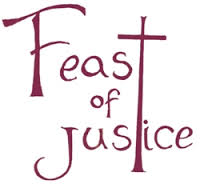How MAP showed the way from the now to the future
Feast of Justice
MAP was an incredibly valuable process…an unbelievably valuable process.
Rev. Tricia Neale, Executive Director

This growth was driven by the needs of its community, reeling from a downturned economy and increasing unemployment. Fortunately, its leadership was far-sighted enough to recognize that partnerships and new sources of funding were vital to its ability to continue to serve these burgeoning needs.
“We realized that we were a large operation with a ‘start-up’ infrastructure,” explained Pastor Tricia Neale.” A former biomedical engineer who gave up a high-paying job at the Mayo Clinic to minister to the congregation at St. John’s Lutheran Church, Rev. Neale was wise enough to know when to recommend to the board that outside expertise was needed.
The board first thought about strategic planning, but when they learned about The Nonprofit Center’s Management Assessment Process (MAP), both executive director and board agreed that they needed to identify their challenges and also what they were doing well, before engaging in a strategic planning process.
“MAP was the perfect approach,” she said, ”we knew that an outside, independent consultant’s opinion would be valuable, enabling us to objectively identify our strengths and weaknesses, to develop a planof what to tackle first,” she added.
Two Nonprofit Center consultants, Sandra Leggieri and Roy Simpson, Jr. worked on Feast of Justice’s MAP, each bringing vast amounts of top level business experience, as well as personal volunteer commitments to the nonprofit community.
“We saw a board who really wanted to take ownership of its governance,” Sandy said, with Roy adding that they knew they could do better and that they wanted to be able to do more. “MAP gave them an opportunity to look at what works well, what can be improved and to have prioritized recommendations,” Sandy said. Roy agreed: “The process itself is valuable because it asks questions the board had never thought of, resulting in lots of ‘ah ha’ moments.”
The consultants emphasize that going through a MAP is not a burdensome process. The organization simply provides requested documents that it already has, and the consultants take it from there, interviewing board and staff members and creating a “report card” for the client, based on reliable metrics.
MAP evaluates 10 key areas of an organization, using a rubric that enables you to evaluate how an organization’s performance compares to best practices. “There’s great value in looking at an organization end-to-end and not making assumptions, thinking that you know what all the issues are,” Sandy said. MAP goes through the entire nonprofit so that you’re not missing anything that can actually be a hidden hindrance. Sometimes you think you know what the problems are, but MAP can actually reveal other problems that trump them,” Sandy stated.
Like so many hard-working organizations, Feast of Justice had been focused on how to handle the now and not the future. “We weren’t able to see issues of partnerships and sustainability because we were constantly out there doing our mission,” said Rev. Neale.
But when the MAP process was completed, they proceeded to approach board development differently, recognizing gaps and proactively filling them with new board members and creating a successful committee structure. Rev. Neale went on to say that MAP prepared them to enter into strategic planning with an accepted focal point that clarified staff needs.
“MAP is organizationally focused, while enabling the board to clearly see their place in the organization,” she said. “MAP showed us where to start and then the steps to take to get to where we knew we needed to be.”
MAP took time and effort, Rev. Neale agreed, “but it gave us the product we needed. Each step of the way, each meeting with a consultant, yielded positive results that moved us forward,” she concluded.
